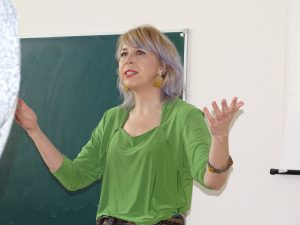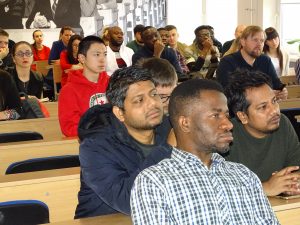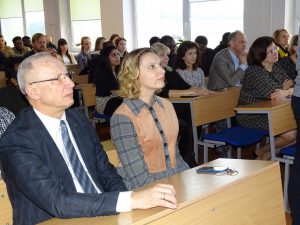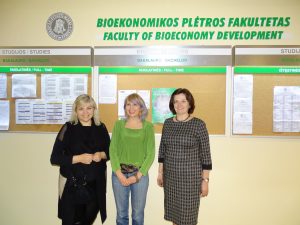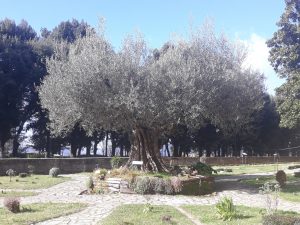Факультет является лидером в области подготовки бухгалтеров и финансовых специалистов!
Факультет является лидером в области подготовки бухгалтеров и финансовых специалистов! 💻💶📈
Присоединяйтесь к вебинару здесь: https://ac.vdu.lt/trd/
Больше информации о программе: https://www.vdu.lt/en/study/program/overview/316/
We cordially invite you to a lecture DIH – a Gateway to the Digital AgriFood Sector Future
Once we receive your registration – we will provide you with further instructions.
Kristina Sermuksnyte-Alesiuniene is a DIH Coordinator at AgriFood Lithuania DIH. She has more than 10 years experience working as Senior Product Development and Innovation Manager with innovations, information technology and services, ICT products in AgriFood sector. For the past two years she has been A Chairman of Agribusiness Commission at Lithuanian Business Confederation, cooperating closely with governmental institutions. Last December in the workshop, organized by European Commission on AgriFood digitalization, she was invited to represent AgriFood Lithuania DIH, as it was selected among the top 5 most actively working DIH’s in EU.
AgriFood Lithuania is a Digital Innovation Hub that brings together major research, business and public stakeholders in Lithuania for the common pursuit of digital transformations in the agriculture, food and associated sectors.
The mission of AgriFood Lithuania DIH is to contribute towards achieving the vision outlined in the EU Declaration of ‘A smart and sustainable digital future for European agriculture and rural areas’ and strengthen the national and European technological infrastructure.
The DIH links stakeholders with international and cross-sector initiatives to provide all-round support in the research, development and deployment of AgriFood Tech innovations.
For Students Attention
Invitation to register for free online seminars on bioeconomy
We would like to draw your attention to the online webinar series of the BIOEASTsUP project, “Advancing Sustainable Circular Bioeconomy in Central and Eastern European Countries”, where an overview of the BIOEAST initiative and the BIOEASTsUP project will be presented. The webinars will provide a comprehensive review of how the BIOEASTsUP project helps the BIOEAST countries in developing national bioeconomy strategies & action plans, building a strategic research and innovation agenda (SRIA) for evidence-based policy making and engaging national stakeholders. The content is designed to contribute towards bioeconomy knowledge of all relevant stakeholders in the BIOEAST network.
1. 21 May 2020, 10:00 CET – Introduction to BIEOEASTsUP activities (open to everyone)
2. 28 May 2020, 13:00 CET – BIOEASTsUP BIO HUBs and national platforms for bioeconomy strategies development (open to BIOEAST NCPs, members of national BAIMG and Stakeholder Groups, TWG and BIOEASTsUP members)
3. 5 June 2020, 10:00 CET – Indicators and statistical evidence for bioeconomy development (open to BIOEAST NCPs, members of national BAIMG and Stakeholder Groups, TWG and BIOEASTsUP members)
4. 15 June 2020, 10:00 CET – Developing multi-stakeholder partnerships and co-creation for boosting the uptake of bioeconomy in CEE (open to everyone)
5. 09 July 2020, 10:00 CET – Planning sectoral analysis and exchange of good practices for bioeconomy value chains (open to everyone)
Registration is available here: https://ec.europa.eu/eusurvey/runner/BIOEASTsUP_Webinar_series_2020
More about the project: https://bioeast.eu/
Webinar: Study opportunities for students and graduates from colleges/universities at VMU Faculty of Bioeconomy Development
We invite You to join a live webinar to discuss study opportunities for students and graduates from Lithuanian colleges/universities of applied sciences at the Faculty of Bioeconomy Development of Vytautas Magnus University.
Webinar will take place on May 18th at 3 p.m. Join webinar in here: https://ac.vdu.lt/trd/
Using your internet browser (Mozilla Firefox or Internet Explorer is recommended) access the link that you were given, select “Enter as a guest“, type the Name and press “Enter Room“ button. Microphone and webcam are not compulsory, unless you wish.
ERASMUS+ project “SMARTRURAL
The project involves 7 universities: Eskişehir Osmangazi University (Turkey), Vytautas Magnus University (Lithuania), Ljubliana University (Slovenia), Alicante University (Spain), University of Economics in Prague (Czech Republic), University of Warmia and Mazury in Olsztyn (Poland) and UNIPEGASO (Italy) .
Work organisation of the Faculty of Bioeconomy Development during the quarantine
Visit to Kiev National Economic University
On February 24-27 assoc. prof. Jolita Greblikaite was visiting Kiev National Economi University (Ukraine) with c0-operation visit. The common work and partnership with Ukrainian colleagues started few years ago with common participation in scientific conferences committees, scientific committees of scientific journals. Future co-operation will be developed inviting Ukrainian students in Exchange programmes, fullfilling common scientific research and forming International research teams. 
Kristina‘s Dryža‘s lecture about today’s being and future in a different way
On the 4th of March, on the initiative of the Entrepreneurship Laboratory and cooperation with VMU World Lithuanian University, Kristina Dryža, an Australian-born Lithuanian, gave a lecture in the Faculty of bioeconomy developmenton. The lecture was on the topic: „What kind of skills and competencies will be important in the near future – 2030”. Lecturer Kristina Dryža is recognised as one of the world’s top female futurists and is also an archetypal consultant and author. Kristina has always been fascinated by patterns for feels we are patterned beings in a patterned universe. She writes and speaks about the patterning of seasonal, tidal, lunar and circadian rhythms and their influence on creativity, innovation and leadership. She also explores archetypes and mythology to perceive the patterns in the collective unconscious and their expression within our psyches, society and media.
K. Dryža introduced to the audience the essence of the imaginal, symbolic, mythic, critical, theoretical and archetypal thinking and being in the world. The lecturer spoke about ambiguous perception of time, patterns, stories and rythms of everyday being. K. Dryža emphasized that we should keep in mind the connection with nature, live in the cycles of nature, and realize that we cannot just harvest, we must also sow and wait, and calmly accumulate strength for the begining of new cycle. The speaker also talked about the lunar cycle and how to relate the rhythm of your life to it. The allegory of caterpillar transformation into a butterfly was used to convey ideas of development, improvement, and change, saying that once a caterpillar is turned into butterfly, it can no longer think and behave like caterpillars because it is already in a different body ant state. The lecturer also talked about the symbols and its meaning to our everyday being. Emphasizing the essential competencies that areexpected to be the most important in the 2030s, K. Dryža emphasized consciousness, collaboration and altruism.
These are just some of the aspects discussed in K. Dryža‘s lecture. In conclusion, the presenter introduced the audience to a slightly different view of the world, everyday life and ourrselves, as well as enriched with insights on future skills and competences.
The lecture was funded by Alumni Club of VMU Academy of Agriculture.
Research internship at university of Perugia
Assoc. prof. dr. Anastasija Novikova from the Research Institute for Bioeconomy visited the University of Perugia during the 10-14 of February. The aim of the visit was to work together on modelling framework for evaluation of agricultural landscape services. The focus was on calculation of residents’ willingness to pay for these services. The colleagues from university of Perugia kindly shared their experience in preparation of research projects and gave advices in paper preparation as well. The visit and stay in the Environmental laboratory of University of Perugia will serve as the continuation of cooperation between the faculties and Departments of the host and home universities.
- About
- About Agri-Food BM programme
- Academic infrastructure units
- All events
- All news
- Aquaculture center
- Archives
- Biosystems Engineering
- Center of Animal husbandry selections, breeding values and dissemination
- Centre of Biosystems Engineering, Biomass Energetics and Water Engineering
- Circular Biobased Economy
- Climate change
- Contacts
- Contacts
- Events
- Events archive
- Faculties
- For business and society
- Innovative products
- International Cooperation
- International projects
- Joint Research Centre of Agriculture and Forestry
- Journal “Human and Nature Safety”
- Laboratory of Technology Safety
- Laboratory services
- Living Environment
- More labs
- News
- Project
- QUALS project description
- Research
- Research areas
- Scientific events
- Scope
- Sitemap
- Studies
- Study programmes
- Technology Transfer & Commercialization
- THE ROLE OF ORGANISATION IN THE PROJECT
- THE ROLE OF ORGANISATION IN THE PROJECT
- THE ROLE OF ORGANISATION IN THE PROJECT
- The Study Process
- Žemės ūkio žinių ir inovacijų sistemos klasteris






